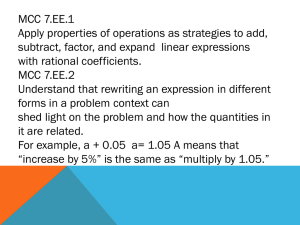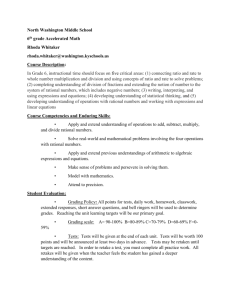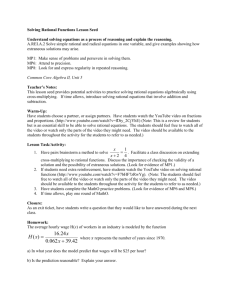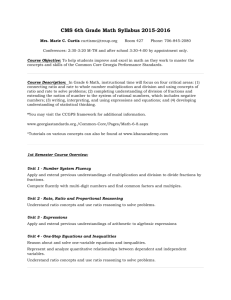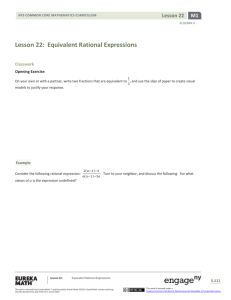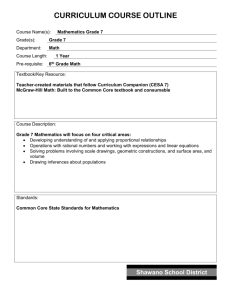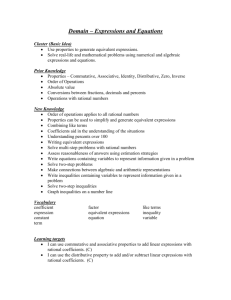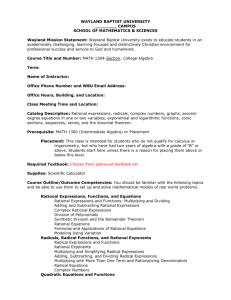Grade 7 Mathematics Module 2, Topic C, Overview
advertisement
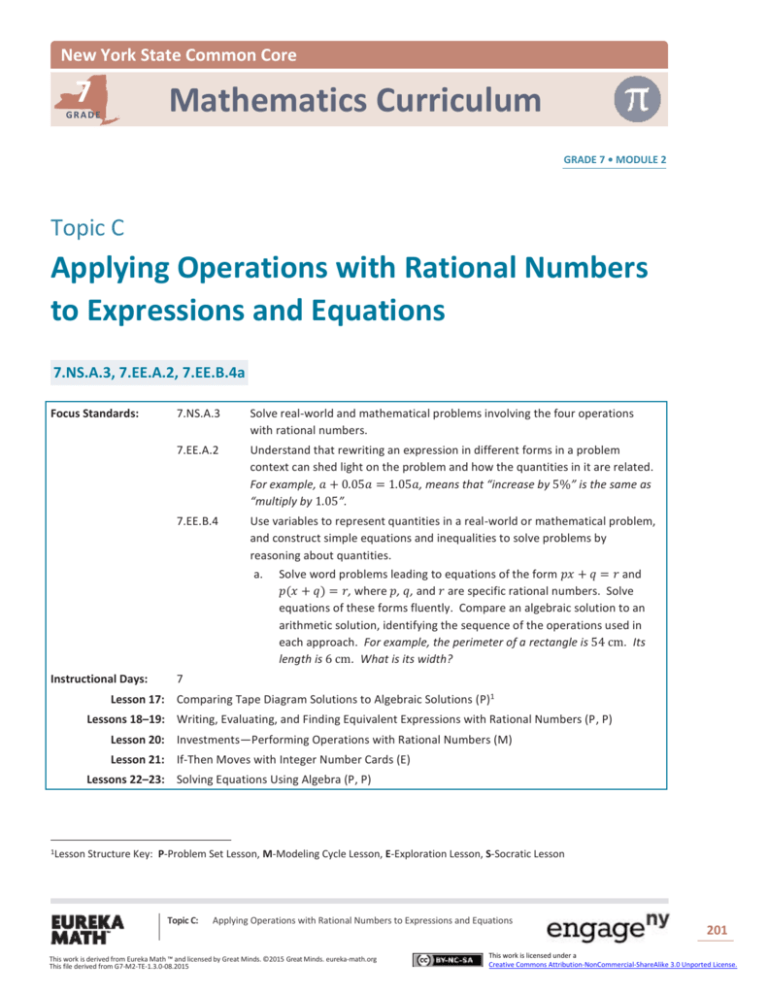
New York State Common Core 7 Mathematics Curriculum GRADE GRADE 7 • MODULE 2 Topic C Applying Operations with Rational Numbers to Expressions and Equations 7.NS.A.3, 7.EE.A.2, 7.EE.B.4a Focus Standards: 7.NS.A.3 Solve real-world and mathematical problems involving the four operations with rational numbers. 7.EE.A.2 Understand that rewriting an expression in different forms in a problem context can shed light on the problem and how the quantities in it are related. For example, 𝑎 + 0.05𝑎 = 1.05𝑎, means that “increase by 5%” is the same as “multiply by 1.05”. 7.EE.B.4 Use variables to represent quantities in a real-world or mathematical problem, and construct simple equations and inequalities to solve problems by reasoning about quantities. a. Instructional Days: Solve word problems leading to equations of the form 𝑝𝑥 + 𝑞 = 𝑟 and 𝑝(𝑥 + 𝑞) = 𝑟, where 𝑝, 𝑞, and 𝑟 are specific rational numbers. Solve equations of these forms fluently. Compare an algebraic solution to an arithmetic solution, identifying the sequence of the operations used in each approach. For example, the perimeter of a rectangle is 54 cm. Its length is 6 cm. What is its width? 7 Lesson 17: Comparing Tape Diagram Solutions to Algebraic Solutions (P)1 Lessons 18–19: Writing, Evaluating, and Finding Equivalent Expressions with Rational Numbers (P, P) Lesson 20: Investments—Performing Operations with Rational Numbers (M) Lesson 21: If-Then Moves with Integer Number Cards (E) Lessons 22–23: Solving Equations Using Algebra (P, P) 1Lesson Structure Key: P-Problem Set Lesson, M-Modeling Cycle Lesson, E-Exploration Lesson, S-Socratic Lesson Topic C: Applying Operations with Rational Numbers to Expressions and Equations This work is derived from Eureka Math ™ and licensed by Great Minds. ©2015 Great Minds. eureka-math.org This file derived from G7-M2-TE-1.3.0-08.2015 201 This work is licensed under a Creative Commons Attribution-NonCommercial-ShareAlike 3.0 Unported License. Topic C NYS COMMON CORE MATHEMATICS CURRICULUM 7•2 Students use algebra and rational numbers in Topic C to problem-solve, building upon their foundational work with rational numbers and expressions and equations in Grade 6 (6.NS.C.5, 6.EE.A.2, 6.EE.A.3, 6.EE.A.4, 6.EE.B.5, 6.EE.B.6, 6.EE.B.7). Topic C begins in Lesson 17 with students finding solutions to word problems by working backward and using tape diagrams to model the algebraic steps they use to arrive at the solution. In Lessons 18 and 19, students create and evaluate equivalent forms of expressions involving rational numbers to see structure, reveal characteristics, and make connections to context (7.EE.A.2). Lesson 20 is a modeling lesson in which students are presented with a scenario related to an investment account’s activity over the course of several years. Students interpret the information and develop a strategy to find the actual changes to the account balance each year. In Lesson 21, students return to the Integer Game that they played in earlier lessons to better understand if-then statements. They relate making the same changes to two equal card-hand totals to making equivalent changes to each side of a true number sentence. Therefore, they show, for instance: If 𝑎 = 𝑏, then 𝑎 − 𝑐 = 𝑏 − 𝑐. Topic C concludes with a two-day lesson. In Lessons 22 and 23, students work toward fluently solving word problems through the use of equations (7.EE.B.4a). Using algebra to deconstruct and solve contextual problems continues as the focus in Module 3. Topic C: Applying Operations with Rational Numbers to Expressions and Equations This work is derived from Eureka Math ™ and licensed by Great Minds. ©2015 Great Minds. eureka-math.org This file derived from G7-M2-TE-1.3.0-08.2015 202 This work is licensed under a Creative Commons Attribution-NonCommercial-ShareAlike 3.0 Unported License.

